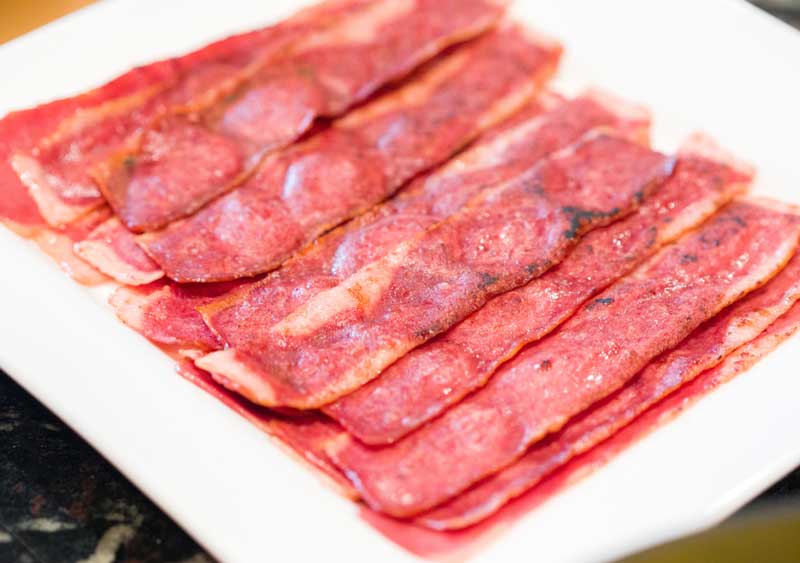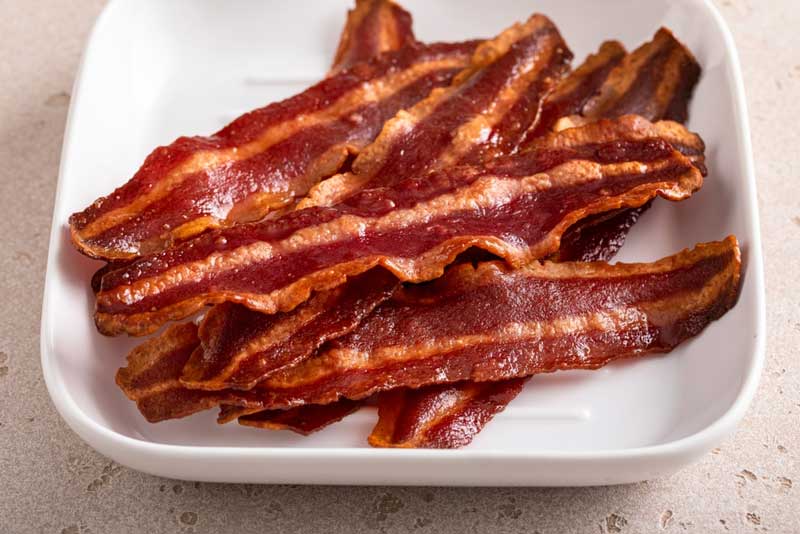If you purchased some turkey bacon and you are stuck with the question, can you eat turkey bacon raw? Then this article is perfect for you.
Turkey bacon is cured and smoked before it is packaged and made available for sale. Because these processes are not considered thorough cooking, some might decide to cook the meat further.
But the question remains; is it necessary to cook the meat further, can you eat turkey bacon raw? Technically, curing and smoking the meat makes it not completely raw. Still, there is nothing wrong with heating the meat a little before consuming it.
Turkey bacon is cooked and prepared to look like pork bacon. However, turkey bacon is a healthier option to pork bacon. The best practice is to check the packaging of the bacon for specifications on whether it should be cooked further or not.
In this article, we will discuss more about turkey bacon, if you can eat it raw, and what you should know before eating it raw. Also, if you want your raw turkey bacon to undergo more cooking, what processes can you take? You will find these and more as you read on.
What Is Turkey Bacon?
As the name goes, turkey skin and meat are incorporated into the making of turkey bacon. The chopped portions are made to look like pork bacon in the way they are shaped after pressing. They usually undergo a curing procedure before putting the meat out for sale.
Because they are not fully cooked, they are mostly referred to as raw. Unlike uncured bacon, turkey bacon is typically less greasy and has lower fat content, making it a healthier choice.
Can you Eat Turkey Bacon Raw?
Certain meat products require only reheating to enhance their enjoyment since they are usually pre-cooked. You should know if turkey bacon falls into the same category, especially if you’re hesitant to cook it.
Raw turkey bacon undergoes the curing and smoking process before they are made available for sale. These processes can be enough reasons to eat turkey bacon without cooking them anymore. If the raw turkey bacon you purchased has undergone these processes, it is safe to eat, and you have little or nothing to worry about, even though it can still be regarded as raw or uncooked.
The best practice is to check the turkey bacon’s package for specifications on whether you are advised to eat it raw or cook it first. If your turkey bacon is frozen, it is best to heat it first for an optimal dining experience. You can also incorporate your refrigerated raw turkey bacon strips in making sandwiches.
Also Read: Can You Eat Raw Scallops? (Best Answer) and Can You Eat Prosciutto Raw? (Everything To Know)
Is It Bad for Me To Eat Turkey Bacon Raw?
While turkey bacon is a viable choice for many individuals, it can have some disadvantages worth considering. The following are some potential downsides of raw turkey bacon:
- Reduced protein content: Turkey bacon has less protein than carbohydrates when compared to pork bacon. It typically has approximately 20 percent less protein than regular pork bacon, which may be something to look at if you are looking for a protein-rich diet.
- Presence of harmful preservatives: Nitrites and nitrates are often used to preserve turkey bacon. These preservatives are artificial and cannot be compared to the nitrites that occur naturally in veggies and fruits. These synthetic nitrites can form harmful nitrosamines and cause throat and stomach cancer.
- Processed meat: Turkey bacon falls under processed meat, and it’s advisable to consume them in moderation. Frequent consumption of processed meats like turkey bacon has been linked with a higher risk of diabetes and heart disease.
- High sugar content: Producers of turkey bacon often add extra sugar to enhance its texture and taste, as it has a lower fat content than pork bacon. This can be problematic for those trying to reduce their carbohydrate or sugar intake. However, it’s worth noting that some brands available that do not include added sugars.
- Elevated sodium levels: The production of turkey bacon often requires the addition of sodium as a preservative and flavor enhancer, thus increasing its sodium content. Two strips of turkey bacon can have around 336 milligrams of sodium, and consuming large portions can quickly add to your overall sodium intake. Keep that in mind if you monitor the amount of sodium you eat.
Are There Any Nutritional Benefits of Turkey Bacon?
For bacon enthusiasts, the idea of bacon derived from anything other than pork might seem implausible. However, considering the potential health dangers associated with eating red meat, it is worth considering the option of turkey bacon, which offers a lighter alternative.
While turkey bacon has lower calories and saturated fat levels than pork bacon, it is important to note that it is still a product of processed meat. It has nitrates, sodium, and saturated fat, so it is advisable to be mindful of your overall intake.
In a regular 16-gram pack of turkey bacon, you have 0.7 grams of carbohydrates, 4.2 grams of fat, 4.8 grams of protein, 6 grams of calories, 0.7 grams, and very low fiber content.
Turkey Bacon has low carbohydrate content and more protein because it is mostly meat, asides from the flavorings and preservatives. The small amount of carbohydrates usually comes from the sugar incorporated.
The fats in turkey bacon can be categorized as saturated and unsaturated. You can increase your protein intake by including turkey bacon in your diet.
It’s worth noting that the nutritional composition of turkey bacon can vary depending on the specific type and the part of the turkey used in its production.
One of these types is made from dark and white meat cut from different parts of the bird. It is soaked in a salt solution and sliced.
The sliced stripes are often cut from the thighs to get bigger chunks of the meat. These chunks are marinated in a flavoring liquid until they form a mass. The mass is sliced into familiar strips and packaged for sale.
Other Benefits of Turkey Bacon
Turkey bacon can be a suitable choice for those who want to lose weight or individuals with specific dietary needs. In addition to its potential risks, turkey bacon offers several benefits. Here are some of the advantages of consuming turkey bacon:
- Lower in calories: Turkey bacon contains lower calories than pork bacon, with approximately 25 percent less saturated fat. This makes it a famous choice for individuals conscious of their fat consumption.
- Cooking ease: Cooking turkey bacon is straightforward and can be done using methods similar to pork bacon, such as microwaving, baking, and pan-frying. The cooking times may vary compared to pork bacon, so following the specifications is important.
- Enjoyable flavor: While turkey bacon may not have the exact texture and taste of pork bacon, it still offers a smoky, salty, and meaty flavor that many people find enjoyable.
- Alternative to pork: For those who do not consume pork due to religious reasons, intolerance, or allergies, turkey bacon is a suitable substitute.
Moreover, it must note that turkey bacon cannot be a flawless alternative to its pork counterpart. The less fat in turkey bacon may result in a different level of crunchiness compared to pork bacon. Nevertheless, it is worth trying for its unique taste.
Turkey Bacon can also be added to the breakfast of shrimp and chicken gumbo, broccoli, quinoa, and spinach.
How to Cook Raw Turkey Bacon?

While it is possible to eat raw turkey bacon, cooking it thoroughly before eating is generally recommended to minimize the risk of food poisoning and other associated health dangers.
Microwaving, frying, and oven cooking are the three most common methods of cooking turkey bacon. Let’s dig into these methods.
Microwaving
- Put paper towels on the microwave-safe plate.
- Place the strips of bacon on the paper towels already on the plate.
- Place extra paper towels on the bacon. Do this for all the plates of bacon.
- Microwave the turkey bacon for one minute and thirty seconds at the highest power. Adjust cooking time in line with the recommendation on the pack.
- Bring out your crispy turkey bacon and enjoy.
Frying
- Place the pan over medium-high heat and add some oil to it
- Put the bacon strips in a pan of hot and bubbling oil.
- Remove the strips from the oil when they are crispy and brown.
Oven Cooking
- Place some baking sheets on a baking tray
- Place the bacon strips on the bacon sheet
- Check the packaging for the cooking time, temperature, and oven.
- Put the baking tray in the oven.
- Once it becomes crispy, it is ready to be consumed.
Frequently Asked Questions-Can You Eat Turkey Bacon Raw?
What’s the Difference Between Turkey and Turkey Bacon?
While turkey is the name given to the meat from the turkey animal, turkey bacon is cuts of dark and white turkey meat that has been processed to look like pork bacon.
Is Turkey Bacon a Pig or Turkey?
Turkey bacon is a combination of seasoned and pressed light and dark turkey meat resembling pork bacon. The calories and fat content of turkey bacon are less than that of pork, with 50 calories and 8 grams less per serving.
Is Turkey Bacon Actually Healthy?
Many individuals conscious of calorie and fat intake opt for turkey bacon instead of regular pork bacon. However, turkey bacon has high sodium content and saturated fat.
Also Checkout: Does Honey Mustard Have Dairy? (Answered) and What Does Ostrich Taste Like? (Answered)
Conclusion-Can You Eat Turkey Bacon Raw?
This article has answered the question Can you eat Turkey bacon raw?
Turkey bacon made from turkey meat is a healthier and leaner choice compared to pork bacon. As much as one is advised to cook the bacon before eating, the fact still stands that turkey bacon can be eaten raw.
While raw food is generally known to be harmful to health, raw turkey bacon usually goes through curing and smoking, technically making it not raw. The best practice is to check the recommendations on the packaging.

